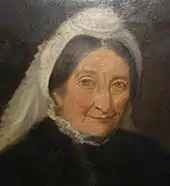Elizabeth Caroline Gray
Elizabeth Caroline Hamilton Gray (née Johnstone; 3 April 1800 – 21 February 1887) was a Scottish historian and travel author, born in Alva, Clackmannanshire,[1] as the eldest daughter of James Raymond Johnstone and Mary Elizabeth Cholmeley.[2] She was the granddaughter of the colonial businessman John Johnstone.[3][4]

After marrying John Hamilton Gray, a priest and genealogist, in June 1829, Gray moved to Bolsover Castle in England, where she lived until shortly before her death.[3][5]
Research
Gray became interested in the history of the Etruscans after visiting an exhibition of their artefacts in London organised by Domenico Campanari in 1837.[6] She pursued the subject on a visit to Italy in 1837–1839, drawing on contacts in German and Italian archaeological circles. In 1840 she published Tour to the Sepulchres of Etruria, which served as a travelogue and an account of her archaeological research. She then wrote a general History of Etruria: the first two volumes in 1843–1844 and the third in 1868.[3]
As a woman, Gray was attacked for conducting historical research. The explorer George Dennis, who went on to write his own history of the Etruscans, stated in a review of Gray's work in 1844 that "any deep or earnest investigation of matters connected with the social institution of a gentile nation is not properly within the female province."[7]
Other than her research on Etruria, Gray wrote a work on the classical and early medieval church and empire, and two popular children's histories of Rome.[3] She and her husband maintained a collection of antiquities acquired both from dealers in Italy and from her own excavations. It included an unusual red-and-black Etruscan amphora in an Italo-Geometric style, known as the "Hamilton Gray vase".[8]
Elizabeth Caroline Gray died on 21 February 1887.[9]
Works
- Tour to the Sepulchres of Etruria. London: J. Hatchard and Son. 1840. (1843 ed.)
- The History of Etruria. London: J. Hatchard and Son. 1843–68. (Vol. 1, 2, 3)
- History of Rome for Young Persons. London: T. Hatchard. 1847. (1858 ed.)
- Emperors of Rome from Augustus to Constantine: Being a Continuation of the History of Rome. London: T. Hatchard. 1850.
- The Empire and the Church, from Constantine to Charlemagne. Oxford: J. Henry and J. Parker. 1857.
References
- Italia antiqua. Storia dell'etruscologia tra archeologia e storia della cultura (in Italian). Orvieto and Rome: Quasar. 2006. p. 32. ISBN 8871402960.
- "Church Registers - Old parish registers - Births and Baptisms". Scotland's People. National Records of Scotland and the Court of the Lord Lyon.
- "Elizabeth Caroline Gray". British Travel Writing. University of Wolverhampton. Retrieved 23 April 2020.
- Burke, John (1835). A Genealogical and Heraldic History of the Commoners of Great Britain and Ireland. Vol. 2. London: R. Bentley. p. 302.
- Williams, Dyfri (2009). "The Hamilton Gray Vase". In Swaddling, Judith; Perkins, Philip (eds.). Etruscan by Definition: Papers in Honour of Sybille Haynes. London: British Museum Press. pp. 10–20: 10. ISBN 978-0861591732.
- de Grummond, Nancy Thomson, ed. (1996). "Campanari Family". Encyclopedia of the History of Classical Archaeology. London and New York: Routledge. p. 225. ISBN 978-1884964800.
- Quoted in Williams 2009, p. 11.
- Williams 2009, p. 13.
- Boase, Frederic (1892). "Gray, Rev. John Hamilton". Modern English Biography. Vol. 1 – via Project Gutenberg.